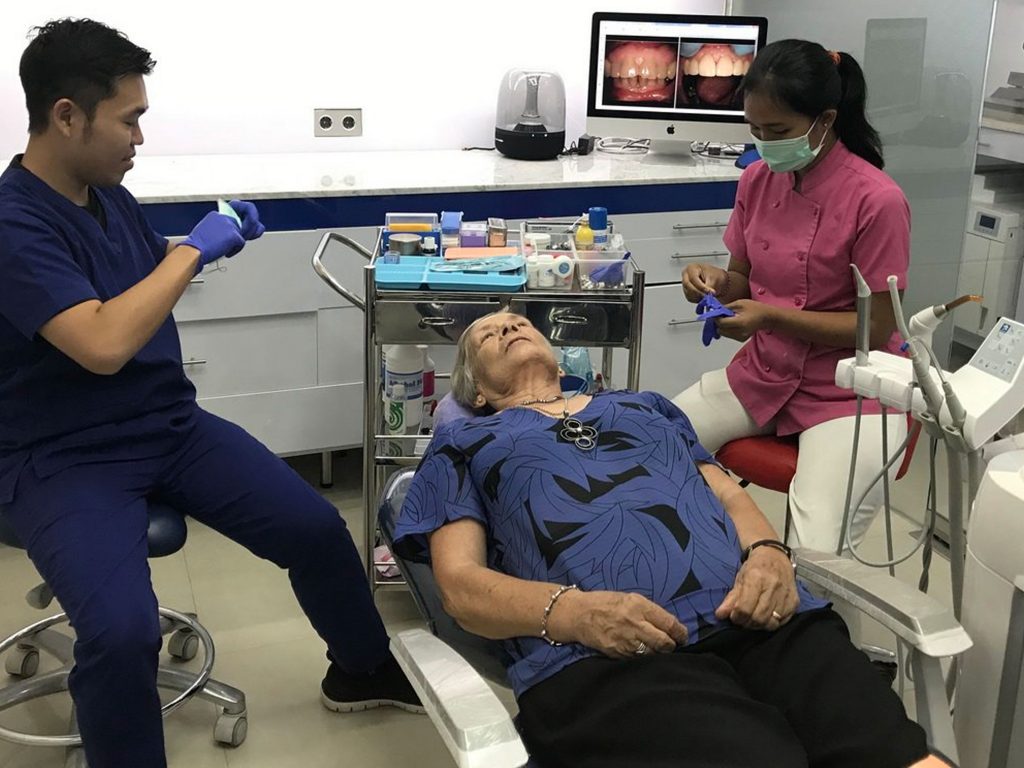Oral Hygiene & Gum Disease Bali Treatments
Periodontitis, also generally called gum disease or periodontal disease, begins with bacterial growth in your mouth and may end — if not properly treated — with tooth loss due to destruction of the tissue that surrounds your teeth.
What is Orthodontics?

Plaque is the primary cause of gum disease. However, other factors can contribute to periodontal disease. These include:
- Hormonal changes, such as those occurring during pregnancy, puberty, menopause, and monthly menstruation, make gums more sensitive, which makes it easier for gingivitis to develop.
- Illnesses may affect the condition of your gums. This includes diseases such as cancer or HIV that interfere with the immune system. Because diabetes affects the body’s ability to use blood sugar, patients with this disease are at higher risk of developing infections, including periodontal disease and cavities.
- Medications can affect oral health, because some lessen the flow of saliva, which has a protective effect on teeth and gums. Some drugs, such as the anticonvulsant medication Dilantin and the anti-angina drug Procardia and Adalat, can cause abnormal growth of gum tissue.
- Bad habits such as smoking make it harder for gum tissue to repair itself.
- Poor oral hygiene habits such as not brushing and flossing on a daily basis, make it easier for gingivitis to develop.
Family history of dental disease can be a contributing factor for the development of gingivitis.
Symptoms & what will happen when left unattended
Gingivitis (gum inflammation) usually precedes periodontitis (gum desease). However, it is important to know that not all gingivitis progresses to periodontitis.
In the early stage of gingivitis, bacteria in plaque build up, causing the gums to become inflamed and to easily bleed during tooth brushing. Although the gums may be irritated, the teeth are still firmly planted in their sockets. No irreversible bone or other tissue damage has occurred at this stage.
When gingivitis is left untreated, it can advance to periodontitis. In a person with periodontitis, the inner layer of the gum and bone pull away from the teeth and form pockets. These small spaces between teeth and gums collect debris and can become infected. The body’s immune system fights the bacteria as the plaque spreads and grows below the gum line.
Toxins or poisons — produced by the bacteria in plaque as well as the body’s “good” enzymes involved in fighting infections — start to break down the bone and connective tissue that hold teeth in place. As the disease progresses, the pockets deepen and more gum tissue and bone are destroyed. When this happens, teeth are no longer anchored in place, they become loose, and tooth loss occurs. Gum disease is the leading cause of tooth loss in adults.
What Are the Symptoms of Gum Disease?
Gum disease may progress painlessly, producing few obvious signs, even in the late stages of the disease. Although the symptoms of periodontal disease often are subtle, the condition is not entirely without warning signs. Certain symptoms may point to some form of the disease. The symptoms of gum disease include:
- Gums that bleed during and after tooth brushing
- Red, swollen, or tender gums
- Persistent bad breath or bad taste in the mouth
- Receding gums
- Formation of deep pockets between teeth and gums
- Loose or shifting teeth

How Is Gum Disease Treated?
The goals of gum disease treatment are to promote reattachment of healthy gums to teeth; reduce swelling, the depth of pockets, and the risk of infection; and to stop disease progression. Treatment options depend on the stage of disease, how you may have responded to earlier treatments, and your overall health. Options range from nonsurgical therapies that control bacterial growth to surgery to restore supportive tissues.
How Can Gum Disease Be Prevented?
Gingivitis can be reversed and the progression of gum disease can be stopped in nearly all cases when proper plaque control is practiced.
Professional clean: Visit your dentist every six months for a dental assessment. professional clean removes plaque and tartar above your gum line that at-home cleaning cannot tackle. Next, a fluoride application will further protect and strengthen teeth.
Oral evaluation: The most important part is your evaluation, which is why dental assessments are more than “just a clean”. Dental assessments provide our team with an invaluable opportunity to carefully inspect your mouth, teeth and gums and identify potential problems as early as possible. We will be looking for signs of tooth decay, loose or broken teeth, damaged tooth fillings and prosthetics or gum disease. Detecting problems in their early stages can prevent them from escalating into more serious complications that are harder, if not impossible, to repair. For example, a simple filling or fissure sealing at the right time could prevent the need for root canal therapy down the track – treatment that is costly, time-consuming and could have been avoided if existing problems were addressed earlier.
Contact D2C Dental Care today to arrange your next dental assessment and learn more about practicing at-home care. Our experienced team look forward to developing a professional relationship with you to maintain optimal oral hygiene, ensuring your natural teeth stay strong and healthy for many years to come.


